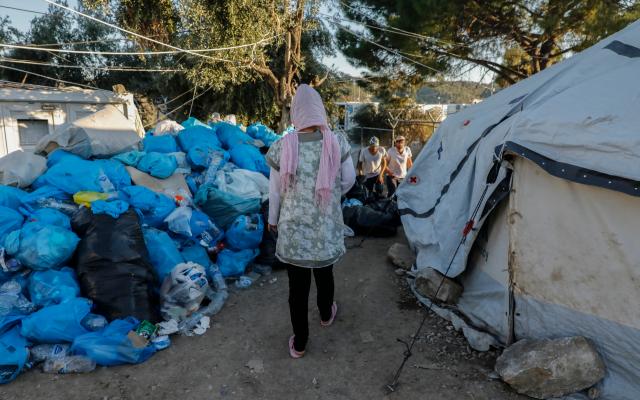
Since January 2015 more than 1 million women, men and children fleeing war, persecution, natural disaster and poverty entered or passed through Greece in search of safety and a better life in Europe. We are working in Lesbos island, one of the main entry points to Europe, responding to the urgent needs of people arriving.
Asylum seekers living in squalid conditions
During the latter part of 2015 and early 2016, selective and arbitrary admissions policies were put in place by European countries such as the closure of their borders and the EU–Turkey deal that aims to return to Turkey people seeking safety in Europe. Ever since, people have been stuck on the Greek islands. Even though numbers fluctuate, the “hotspots” have constantly hosted much more people than they should, reaching sometimes up to six times their actual capacity.
Asylum seekers on Lesbos live in squalid conditions and are exposed to violence, including sexual and gender-based violence. One third of the population arriving are children, often without their parents. Due to the chronic shortage of public health workers in the hotspot, children are often wrongly identified as adults and sent to live within the general camp population, unprotected and unsupervised.
“Does the rest of Europe even know that we are here? Do they know that we are more than 200 people in this camp living like this?”
People seeking asylum on the Greek islands have to navigate a complex legal system, with changes occurring on a weekly basis, making it difficult for even the most well-informed within the system to keep track.
For people who are unaware of their rights, suffering from severe trauma, health issues and disabilities, or with limited literacy, it is nearly impossible to navigate in these procedures.
Substandard living conditions and lack of adequate accommodation, medical care and information have heightened people's vulnerability, depression and uncertainty. While waiting for their asylum claim to be processed, or trying to reach family elsewhere in the European Union, people are left with little information about their rights, legal options and prospects.

The 'Olive Grove' camp, which belongs to the EU refugees 'hotspot' of Moria in Lesvos, Greece. People in this camp are living in deplorable and degrading living conditions, which deteriorate their health, safety and wellbeing. Photo: Giorgos Moutafis/Oxfam
Oxfam’s response
Oxfam started operating in Greece in October 2015, through a humanitarian intervention providing clean water, sanitation, food and non-food items, as the situation for people arriving irregularly from Turkey rapidly increased.
From April 2020, Oxfam is working with and through the Greek Council for Refugees (GCR). Through this partnership, we ensure direct protection and legal aid services to asylum seekers on Lesbos. Together, we also advocate for better living conditions and upholding the human rights of asylum seekers.
The work in Greece is part of Oxfam’s wider migration program across Europe, which challenges how European governments are currently responding to irregular migration. Through our program, we present alternatives to the current system and advocate for relocating asylum seekers where necessary in order to uphold their human rights.
Oxfam's campaigning work
Oxfam is calling on Greece, with the support of other EU Governments and the European Commission, to:
- End the geographical restriction that prevents asylum seekers from leaving the Greek islands and results in overcrowding and deteriorating living conditions.
- Increase long-term reception and accommodation capacity and services on the mainland to evacuate the overcrowded “hotspots”.
- Urgently deploy additional expert staff in the reception and identification centres (RICs) on the islands, including doctors, psychologists, child psychologists and cultural mediators, to ensure that all people seeking asylum receive adequate medical and psychosocial treatment upon arrival, and that all vulnerable people are identified as such.
- Support enough lawyers to provide free legal assistance to asylum seekers on the islands by hiring state-funded lawyers and funding legal aid organisations and NGOs already providing legal information and assistance to asylum seekers.
Oxfam is calling on EU Governments to:
- Share responsibility with Greece for receiving and welcoming asylum seekers to Europe. In the short-term, this can be done through temporary arrangements with Greece to relocate and host asylum seekers in other EU countries.
Read our recent blog posts and reports:
In Moria camp, I see the tragic human consequences of a political solidarity crisis
Oxfam’s program is funded by the Crisis and Support Center (CDCS) of the French Ministry of Europe and Foreign Affairs, Lawyers Against Poverty, as well as members of the public from around the world.